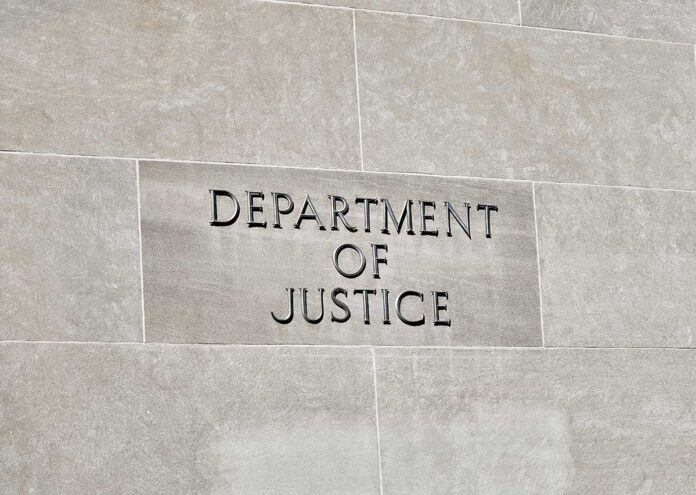The Department of Justice (DOJ) has filed a lawsuit against the state of Alabama after Republican Gov. Kay Ivey signed a law criminalizing medical care for trans youth. The lawsuit is the first the DOJ has filed against any state over restrictions on gender-affirming healthcare.
Bills threatening trans healthcare are being proposed nationwide in record numbers in 2022.
The DOJ suit was filed in U.S. District Court in Alabama on April 29 and cites violation of the Fourteenth Amendment’s Equal Protection Clause as the basis for the suit.
In a statement to PGN, the DOJ says it “filed a complaint challenging a recently enacted Alabama law, Senate Bill (S.B.) 184, that denies necessary medical care to children based solely on who they are, and that threatens criminal prosecution and jail time to doctors, parents, and anyone else who provides or ‘causes’ that care. The United States’ complaint alleges that the new law’s felony ban on providing certain medically necessary care to transgender minors violates the Fourteenth Amendment’s Equal Protection Clause. The department is also asking the court to issue an immediate order to prevent the law from going into effect.”
As the DOJ’s statement explains, “S.B. 184 makes it a felony for any person to ‘engage in or cause’ specified types of medical care for transgender minors. S.B. 184 thus discriminates against transgender youth by denying them access to certain forms of medically necessary care. It further discriminates against transgender youth by barring them from accessing particular procedures while allowing non-transgender minors to access the same or similar procedures.”
The DOJ also detailed the severity of the penalties for violating the Alabama law which include up to 10 years of imprisonment and a fine of up to $15,000. The DOJ statement also notes that “S.B. 184 would force parents of transgender minors, medical professionals, and others to choose between forgoing medically necessary procedures and treatments, or facing criminal prosecution. The United States’ complaint alleges that S.B. 184 violates the Equal Protection Clause by discriminating on the basis of sex and transgender status.”
In a statement, the Alabama governor said her reason for signing the bill was simple: “There are very real challenges facing our young people, especially with today’s societal pressures and modern culture,” Ivey said.
She added, “I believe very strongly that if the Good Lord made you a boy, you are a boy, and if he made you a girl, you are a girl.”
Ivey also said, “We should especially protect our children from these radical, life-altering drugs and surgeries when they are at such a vulnerable stage in life.”
In addition, Ivey signed a bill restricting trans students from using school facilities — bathrooms, changing rooms, and locker rooms — divided by gender that correspond with their gender identity. That bill, HB 322, also bans discussions of “sexual orientation or gender identity” in kindergarten through fifth grade that is “not age appropriate or developmentally appropriate.”
Ivey said in her statement, “We are talking about five-year-olds for crying out loud. We need to focus on what matters — core instruction like reading and math.”
The American Civil Liberties Union, the ACLU of Alabama, Lambda Legal and the Transgender Law Center have all noted intent to file suit against Alabama regarding the laws as soon as Ivey signed them.
“The Alabama Legislature and Governor Kay Ivey need to consider the time and resources they will invest, not to mention the stain of discrimination that often means lost opportunity and investment, and ask themselves if targeting the health care of children is truly worth it, because we are prepared to make that investment in order to protect transgender youth, their families, and their doctors in Alabama,” said Sruti Swaminathan, staff attorney for Lambda Legal, in a statement.
Human Rights Campaign Alabama State Director Carmarion D. Anderson-Harvey issued the following statement in response to Ivey signing the bills into law.
“Governor Ivey should be ashamed of the action she has taken to target trans kids in Alabama for exclusion and discriminatory treatment. This legislation helps no one, and no constituency that stands to benefit from this. But LGBTQ+ kids, especially transgender kids, will be harmed by this law. They’ll be forced to bear the cost of further discrimination — discrimination that already causes transgender youth to feel unsafe in school — just because self-serving politicians chose to use their existence to score political points. Ivey’s signature on this horrid bill is an embarrassment to herself, her administration, and the entire state of Alabama.”
Ivey’s office did not respond to PGN’s request for comment on the Justice Department’s lawsuit.
On March 31, the DOJ’s Civil Rights Division responded to the volume of anti-trans legislation with a letter to state attorneys general. The letter warned the states against “enacting any measures that restrict federal constitutional and statutory provisions that safeguard transgender youth.”
The letter reads in part, “Intentionally erecting discriminatory barriers to prevent individuals from receiving gender-affirming care implicates a number of federal legal guarantees. A state or local government must meet the heavy burden of justifying interference with that right since it is well established within the medical community that gender-affirming care for transgender youth is not only appropriate but often necessary for their physical and mental health.”
The Justice Department last year issued a similar warning against states enacting laws affecting transgender athletes. It later filed court documents for cases in West Virginia and Arkansas in June 2021. Additional information about the Civil Rights Division’s work to uphold and protect the civil and constitutional rights of LGBTQI+ individuals is available on its website at https://www.justice.gov/crt/lgbtqi-working-group/. Complaints about discriminatory practices may be reported to the Civil Rights Division through its internet reporting portal at https://civilrights.justice.gov/.

